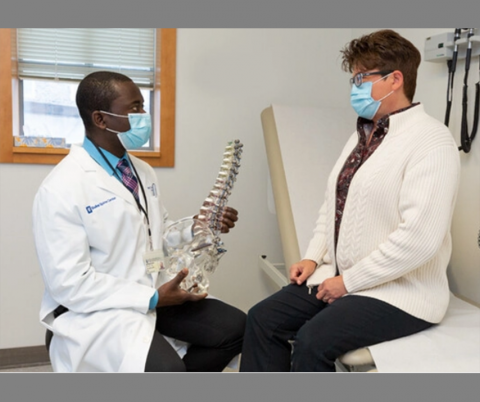Spine Surgery Patient Navigators (2023-2024)
Background
Chronic back pain is one of the top five leading causes of disability worldwide. In the United States, about one in four adults has chronic back pain at any given time.
However, studies have demonstrated that patients of certain demographics have a higher burden of disease. Low-income patients have longer hospital stays after surgery and more frequently go to the emergency room after discharge. Non-Hispanic Black and Hispanic people are undertreated for pain and less likely to undergo surgery, despite reporting more severe back pain and disability. These groups may also face an increased risk of complications during or after back surgery.
Optimal outcomes are achieved when the management of back pain is multimodal. Interventions providing social and emotional support after surgery can decrease stress, anxiety and hospital length of stay, while physical movement after surgery decreases length of stay and risk of complications.
Project Description
This project seeks to improve health outcomes for patients undergoing spine surgery. The team will work directly with surgical spine patients at Duke Hospital with three primary aims:
- Improve patients’ access to and utilization of existing healthcare resources. Barriers to optimal surgical care and MyChart utilization will be identified at the first appointment with a spine surgeon. All patients meeting inclusion criteria will receive a handout of community resources. For patients not enrolled in MyChart, team members will provide education on patient portal use, including enrolling, reviewing results and messaging providers.
- Expand the social support network of patients undergoing spine surgery. Preoperatively, team members will meet patients and identify goals of care in conjunction with their spine provider. Postoperatively, team members will serve as an additional liaison between the patient and providers via biweekly calls, during which they will check in on the patient’s mental and physical health.
- Improve patients’ physical status and mobility in the immediate postoperative period. Team members will visit their patients each day postoperatively, assist in completing postoperative mobility exercises, and discuss and demonstrate the recommended home mobility exercises. Further, they will confirm that patients have access to a physical therapist and can attend appointments.
Throughout the year, the team will conduct qualitative and quantitative analyses to assess the outcome of this intervention. All member will contribute to at least two scholarly outputs (e.g., publications, abstracts for conferences, presentations). Additionally, the project will host three guest speakers each semester to discuss topics related to the project such as nonsurgical treatment of back pain, the opioid epidemic and health policy related to expanding access to surgical care.
Anticipated Outputs
Systematic review of barriers to care among spine patients in U.S.; abstracts for poster or oral presentation at a conference and Duke Orthopedic Surgery research day; grant proposals
Student Opportunities
Ideally, this project team will include 5 graduate students and 10 undergraduate students. Students with interests in community engagement and achieving health equity are encouraged to apply, especially those from underrepresented racial and ethnic minorities. Among undergraduate students, fluency in Spanish is a plus.
Undergraduate students should be interested in medical research and improving health outcomes. Majors of interest include neuroscience, public policy, biology or biological sciences and global health. Proficiency in Microsoft Word, Excel and PowerPoint is recommended for team members.
First- and third-year Duke medical students will be strong candidates for team leaders and patient coordinators. These students will be expected to use their clinical skills and knowledge to help optimize the team’s ability to engage with patients.
All students will benefit from deepening their understanding of how socioeconomic factors impact a patient’s healthcare experience. They will work directly with patients and have opportunities to attend clinic visits. Medical students can go to the operating room, and will build leadership and mentorship skills by helping teach undergraduate students how to interact with patients.
In Fall 2023, this team will meet on Tuesdays from 2:00-3:00 p.m.
Team members will have the opportunity to continue work in the summer of 2024. Ideally, students will work for six weeks for about five hours a week; those focusing on data analysis and manuscript writing will have the option to work remotely.
Antoinette Charles and Dana Rowe will serve as project managers.
Timing
Fall 2023 – Spring 2024
- Fall 2023: Create systematic review of barriers to care for spine patients in the U.S.; start student-patient pairing and support
- Spring 2024: Student navigators continue to work with patients; analyze data from first subset of paired patients; students present at neurosurgery grand rounds and orthopedic research day
- Summer 2024 (optional): Continue data analysis; prepare summary of outcomes of intervention; submit research project and findings for publication
Crediting
Academic credit available for fall and spring semesters; summer funding available
Image: Spine Care, by DukeHealth

Team Leaders
- Antoinette Charles, School of Medicine–Medical Student
- Melissa Erickson, School of Medicine-Orthopaedic Surgery
- Rory Goodwin, School of Medicine-Neurosurgery
- Dana Rowe, School of Medicine–Medical Student
/graduate Team Members
-
Alissa Arango, Biomedical Sciences
-
Emily Luo, Medicine MD Third Year, Clinical Research-Certificate
-
Edwin Owolo, Medicine MD Fourth Year
/undergraduate Team Members
-
Avery Bernazard, Cultural Anthropology (AB)
-
Mariana Bouchan
-
Julian Diaz-Ayala, Biomedical Engineering (BSE)
-
Disha Jotsinghani, Neuroscience (BS)
-
Advika Kumar, Biology (BS)
-
Cristal Ortiz, Neuroscience (BS)
-
Kristina Schaufele
-
Jennifer Smith, Neuroscience (BS)
-
Nathan Strang, Biology (BS)
/yfaculty/staff Team Members
-
Erica Harris, Duke Hospital–DN Anesthesia
-
Ashley Satterly, Duke Hospital–PT/OT Adult Inpatient Services
/zcommunity Team Members
-
Duke University Health System
